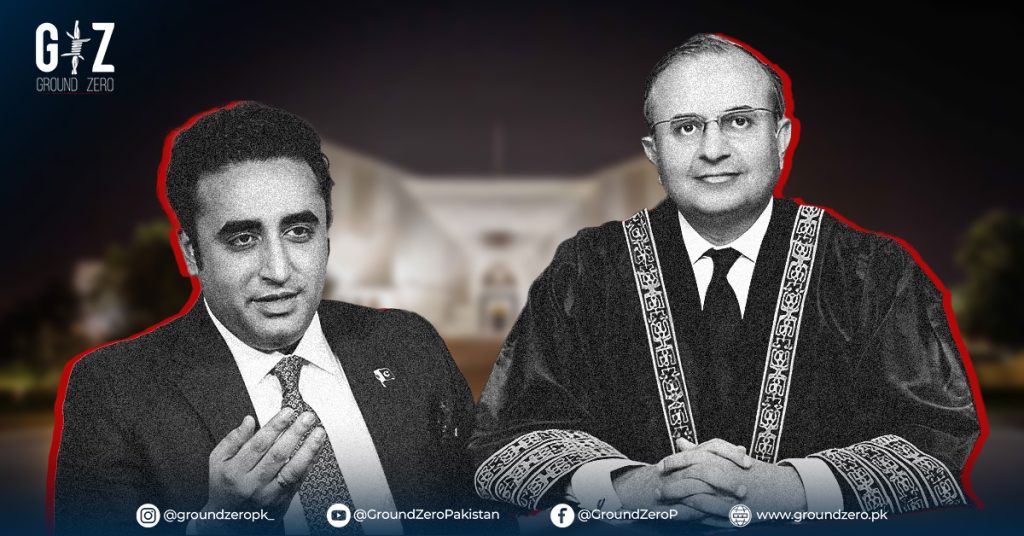PPP Chairman Discusses Constitutional Courts Amendment and Upcoming CJP Appointment
PPP Chairman Bilawal Bhutto-Zardari has expressed confidence that Justice Mansoor Ali Shah will be appointed as the next chief justice of Pakistan (CJP), taking over from Justice Qazi Faez Isa, who is set to retire next month. Additionally, Bhutto-Zardari outlined his party’s vision for the constitutional courts amendment, which is part of a broader package of reforms that the PPP and PML-N leadership are advocating through the Charter of Democracy.
Importance of the Constitutional Courts Amendment
During a televised interview, Bhutto-Zardari emphasized the need for creating constitutional courts as outlined in the PPP’s and PML-N’s joint agenda. This amendment would not only establish these courts but also shift focus away from the age-based criteria for the appointment of judges, which is being debated. The PPP’s stance, as reiterated by its chairman, focuses on establishing term-based limits for constitutional courts, rather than focusing on the age of the chief justice. The PPP’s proposal aims to introduce judicial reforms that enhance efficiency while maintaining a balance between judicial independence and parliamentary oversight. Visit our Opinions section for further analysis.
Challenges in Securing a Two-Thirds Majority
Bhutto-Zardari candidly discussed the obstacles in securing the two-thirds majority required to pass the proposed amendments, highlighting that the support of JUI-F chief Maulana Fazlur Rehman is crucial for achieving this goal. While the PPP is eager to see the constitutional courts amendment through, Bhutto-Zardari acknowledged that without Maulana Fazl’s endorsement, the amendment’s passage is impossible. “Passing the constitutional amendment without Maulana’s [Fazlur Rehman] affirmation is impossible,” he said, emphasizing the importance of consensus-building to move forward with the legislation.
The PPP chairman revealed that despite earlier objections from Maulana Fazl, ongoing engagement between the PPP and the government aims to address these concerns. The discussions have focused on reconciling differences between the drafts proposed by the PPP and other parties, with the goal of finalizing a document that could secure the necessary support for passage. For related updates, see Dawn’s report.
Judicial Appointments and the Age Debate
One of the more contentious aspects of the constitutional package has been the question of whether the chief justice’s age limit should be adjusted. Bhutto-Zardari reiterated that the PPP’s proposal does not focus on age, noting that any changes to the age limit could appear “individual-specific” and politicize the judicial appointment process. He clarified that the PPP has instead proposed term-based limits for the newly envisioned constitutional courts.
The government’s proposal includes a provision to raise the CJP’s retirement age to 67 with a three-year term, a suggestion that has not sat well with all political stakeholders, including the JUI-F, which prefers retaining the current retirement age of 65. Bhutto-Zardari also warned against making the age limit a point of contention, especially with Justice Mansoor Ali Shah set to take over as the next chief justice.
Maulana Fazl’s Role in the Legislative Process
The JUI-F leader Maulana Fazlur Rehman holds a pivotal position in the passage of the proposed amendments. According to Bhutto-Zardari, ongoing discussions with the JUI-F aim to resolve differences and bring the party on board with the constitutional courts amendment. Maulana Fazl’s concerns, particularly regarding judicial age limits and other provisions in the draft legislation, are key issues being addressed by the PPP and PML-N leadership.
Without the support of Maulana Fazl and his party, securing the two-thirds majority required for the constitutional amendment would be impossible. For now, both the PPP and government are in talks with Maulana Fazlur Rehman to iron out the issues and ensure smooth passage of the reforms. Bhutto-Zardari remains optimistic, noting that consensus could pave the way for significant judicial reforms. Read more on Express Tribune’s coverage.
Conclusion: PPP’s Vision for Judicial Reform
The constitutional courts amendment marks a significant step toward judicial reform in Pakistan, with the PPP and PML-N working together to achieve long-term structural changes to the judiciary. While the proposed legislation faces challenges, particularly in securing a two-thirds majority, Bhutto-Zardari remains confident that Justice Mansoor Ali Shah will assume the position of CJP next month. At the same time, efforts to bring Maulana Fazlur Rehman on board remain crucial for the success of the reform package.


